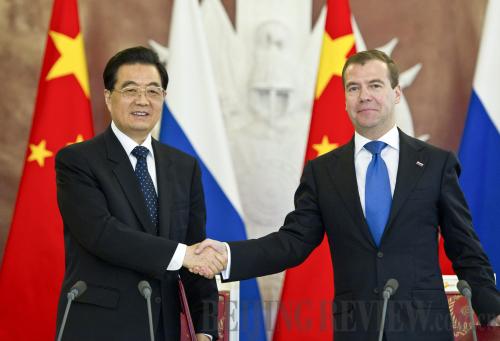|
 |
|
GLOBAL REACH: Visiting Chinese President Hu Jintao and Russian President Dmitry Medvedev sign a joint statement on the international situation and major international issues in Moscow on June 16 (LI XUEREN) |
Chinese President Hu Jintao visited Kazakhstan, Russia and Ukraine from June 12 to 20. Chinese analysts said his Eurasian trip would contribute to promoting regional peace and stability as well as boosting the common development of the four countries.
Hu's visit improved China's friendly cooperation with the three countries, and gave impetus to the development of the Shanghai Cooperation Organization (SCO), said Shen Jiru, a research fellow with the Institute of World Economics and Politics at the Chinese Academy of Social Sciences (CASS).
The Chinese president began his trip from Kazakhstan, where he attended the annual summit of the SCO. This year marks the SCO's 10th anniversary, and China and Russia are also celebrating the 10th anniversary of the signing of the Sino-Russian Treaty of Good-Neighborliness, Friendship and Cooperation. Hu's state visit to Ukraine is the first by a Chinese head of state in the past 10 years.
In Astana, Hu held talks with his Kazakh counterpart Nursultan Nazarbayev. They agreed to establish an "all-round strategic partnership" between China and Kazakhstan. Hu also put forward a set of proposals for expanding bilateral cooperation, including raising two-way trade volume from $20.4 billion in 2010 to $40 billion by 2015.
Shen said Kazakhstan should improve economic cooperation with China because their trade and economic structures were highly complementary and there was mutual dependence. The two sides should therefore plan future cooperation for greater mutual benefit.
During his state visit to Russia, Hu attended the St. Petersburg International Economic Forum. In Moscow, President Hu and Russian President Dmitry Medvedev and Prime Minister Vladimir Putin exchanged views on the development of the Sino-Russian relationship in the next decade.
Leaders of the two countries agreed to develop a "comprehensive strategic cooperative partnership featuring equality, mutual trust, mutual support, common prosperity and lasting friendship."
In terms of practical cooperation, Hu said the two sides should work to boost bilateral trade, with the goals of reaching $100 billion by 2015 and $200 billion by 2020. Chinese statistics show Sino-Russian trade hit $55.45 billion in 2010, up 42.9 percent from the previous year.
Hu and Medvedev signed a joint statement on the current international situation and major international issues. They also signed a joint statement marking the 10th anniversary of the Sino-Russian Treaty of Good-Neighborliness, Friendship and Cooperation, noting the two countries' relations had developed rapidly across the board in the past decade.
At the St. Petersburg forum, Hu made a speech, saying China would like to make joint efforts with other countries to address global economic challenges. China and Russia signed a number of trade and economic agreements during Hu's visit.
Xing Guangcheng, a research fellow on Russian studies from the CASS, said agreements reached between Hu and Medvedev on deepening the Sino-Russian strategic cooperative partnership showed high-level political mutual trust between the two countries.
Given their sound political relationship, the two countries' economic cooperation is destined to make headway, he said. From January to April this year, bilateral trade volume reached $22.4 billion, up more than 30 percent from the same period last year.
During his state visit to Ukraine, President Hu met Ukrainian President Viktor Yanukovich and other leaders for discussions about upgrading Sino-Ukrainian ties. Hu and Yanukovich signed a joint statement on developing a strategic partnership, lifting bilateral relations to a higher level. The two sides signed business agreements valued at $3.5 billion, concerning cooperation in agriculture, energy and technology.
Zhu Honggen, a researcher with the Institute of Russian, Eastern European and Central Asian Studies at the CASS, said developing a friendly relationship with China was an important part of Ukraine's diplomacy.
Zhu said there was a lot of room for China and Ukraine to improve their trade relations. As Ukraine's per-capita GDP remains low, the country prefers inexpensive products to expensive goods from Europe.
Attracting Chinese investment would help Ukraine get rid of residual effects of the economic crisis and open the way for greater bilateral trade. Increasing investment in Ukraine is beneficial to China as well, because transferring extra capital through investment to other countries would optimize China's resource allocation, said Zhu. | 